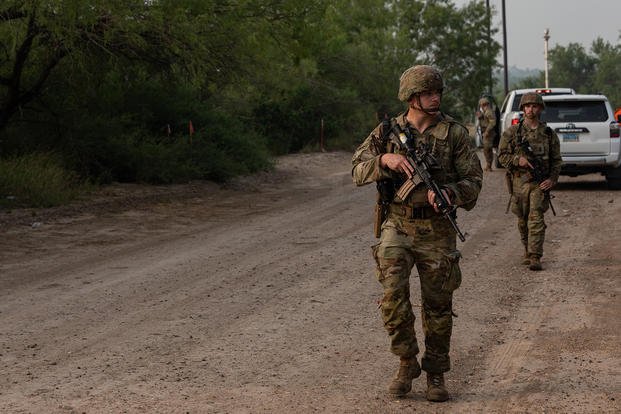Another judge in a border state is dismissing charges against people accused of trespassing into the Trump administration's newly created military zones between the U.S. and Mexico, marking the latest legal setback for the immigration crackdown strategy.
U.S. Magistrate Judge Miguel Torres last week began throwing out some charges in the cases before the U.S. District Court of West Texas related to violating defense property security and unlawful entry onto a Department of Defense installation. The judge deemed there was not probable cause to continue with those charges, according to federal court dockets reviewed by Military.com.
The dropping of charges in El Paso mirrors similar court decisions on charges related to the military zones in New Mexico. A federal judge there dismissed charges related to trespassing on defense property in nearly 100 cases last week.
Read Next: Request for 20,000 Guardsmen to Help with Immigration Crackdown Under Review, Guard Chief Says
In Texas, El Paso Matters, a nonprofit local newsroom, reported that 16 of the military zone cases had been dismissed as of last week.
President Donald Trump ordered that narrow areas of federal land along the border in multiple states be transferred to the military in an effort to snare migrants crossing illegally into the U.S. The military designation has elevated the role of troops in his nationwide immigration crackdown and also enabled harsher penalties against migrants, who can now be charged with crimes related to trespassing on a military installation and face higher fines and more jail time.
The recent court decisions have delivered an early legal setback to the Trump administration's immigration strategy. But there have been some successful charges alleging individuals trespassed onto the new national defense area in Texas, where federal land was turned into a 63-mile, noncontigious extension of Fort Bliss.
The U.S. Attorney's Office for the Western District of Texas said in a news release Tuesday that 60 defendants had pleaded guilty and were convicted of charges related to trespassing onto the military-controlled land.
"These convictions are a positive step in the judicial process of deterring illegal immigration, and I am very grateful to our El Paso Division staff and to our federal law enforcement and military partners for their diligent work in securing our borders," Margaret Leachman, the acting U.S. Attorney for the Western District of Texas, said in the news release.
Texas immigration advocates told Military.com that the creation of the new zone in the Lone Star State marks the latest crafted effort to hit migrants with more legal troubles.
Danny Woodward, an attorney with the Texas Civil Rights Project, said Operation Lone Star -- the Texas National Guard's long-standing mission at the border -- saw a massive push in pursuing private property trespassing charges against migrants in recent years. He sees the latest creation of the military zone as a similar effort.
"I think that they're grasping at straws a little bit, trying to figure out ways to add charges to people," Woodward said. "It's something that we've seen here in Texas, and it's been a real struggle."
Maj. Geoffrey Carmichael, a spokesman for Joint Task Force-Southern Border, said a total of 190 individuals had been detected in the New Mexico and Texas National Defense areas as of Tuesday. Under the current arrangement, the military is spotting border crossers, who are then typically detained by other federal authorities.
Carmichael declined to specifically comment on the charges being dropped, but added that the military is still staying dedicated to its border enforcement mission.
"Joint Task Force-Southern Border continues to stay laser-focused on its mission, whether it's warning sign installation in the most rugged and challenging areas along the border, joint patrols alongside U.S. Border Patrol to detect trespassers, or bringing to bear any of the other unique military capabilities we offer in order to achieve 100% operation control of the southern border," Carmichael said.
The signs posted along the military border zone in Texas were, in part, at the heart of some of those charge dismissals last week, El Paso Matters reported. The judge questioned their placement as well as if they could be read before entering the defense land.
"Conspicuous matters. Where signs are matters. What they look like matters," Torres said in court, El Paso Matters reported, adding, "If you have to be right up on the sign to see it, you've already committed the offense."
El Paso Matters reported during last week's hearing that some Border Patrol agents said they had not actually seen the signs themselves but claimed they had been placed every hundred feet or so.
At one point, a defense attorney reportedly lifted up a copy of the 12-by-18-inch sign and asked a Border Patrol agent whether he could read it from less than 20 feet away. The officer couldn't read it from that distance, El Paso Matters reported.
"Given our experience here in Texas, I would be surprised if they're able to make it stick for a long period of time in courts," Woodward said. "But I don't think that's going to stop them from trying new and novel things like this."
Related: Judge Throws Out Cases of Migrants Charged with Crossing Military Zone at Border














